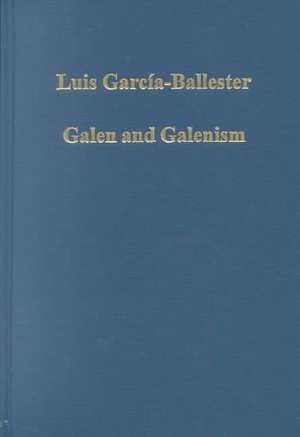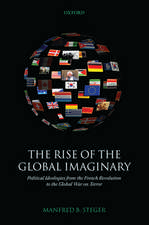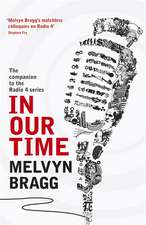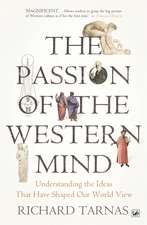Galen and Galenism: Theory and Medical Practice from Antiquity to the European Renaissance: Variorum Collected Studies
Autor Luis García-Ballester, Jon Arrizabalaga, Montserrat Cabré, Lluís Cifuentesen Limba Engleză Hardback – 23 dec 2002
Din seria Variorum Collected Studies
- 9%
 Preț: 938.85 lei
Preț: 938.85 lei -
 Preț: 311.41 lei
Preț: 311.41 lei -
 Preț: 351.48 lei
Preț: 351.48 lei -
 Preț: 313.38 lei
Preț: 313.38 lei -
 Preț: 386.77 lei
Preț: 386.77 lei -
 Preț: 325.68 lei
Preț: 325.68 lei -
 Preț: 396.00 lei
Preț: 396.00 lei -
 Preț: 312.75 lei
Preț: 312.75 lei - 9%
 Preț: 1041.23 lei
Preț: 1041.23 lei -
 Preț: 258.66 lei
Preț: 258.66 lei -
 Preț: 299.55 lei
Preț: 299.55 lei - 9%
 Preț: 938.08 lei
Preț: 938.08 lei -
 Preț: 343.33 lei
Preț: 343.33 lei -
 Preț: 311.18 lei
Preț: 311.18 lei - 9%
 Preț: 937.13 lei
Preț: 937.13 lei -
 Preț: 351.41 lei
Preț: 351.41 lei -
 Preț: 320.00 lei
Preț: 320.00 lei - 34%
 Preț: 764.20 lei
Preț: 764.20 lei - 23%
 Preț: 315.48 lei
Preț: 315.48 lei - 36%
 Preț: 740.06 lei
Preț: 740.06 lei - 34%
 Preț: 764.20 lei
Preț: 764.20 lei - 34%
 Preț: 680.73 lei
Preț: 680.73 lei - 26%
 Preț: 247.40 lei
Preț: 247.40 lei - 34%
 Preț: 485.78 lei
Preț: 485.78 lei - 38%
 Preț: 766.91 lei
Preț: 766.91 lei - 34%
 Preț: 767.07 lei
Preț: 767.07 lei - 34%
 Preț: 764.20 lei
Preț: 764.20 lei - 34%
 Preț: 769.51 lei
Preț: 769.51 lei - 38%
 Preț: 769.85 lei
Preț: 769.85 lei - 34%
 Preț: 826.68 lei
Preț: 826.68 lei - 25%
 Preț: 225.28 lei
Preț: 225.28 lei - 25%
 Preț: 225.54 lei
Preț: 225.54 lei - 34%
 Preț: 736.38 lei
Preț: 736.38 lei - 34%
 Preț: 738.43 lei
Preț: 738.43 lei - 25%
 Preț: 226.52 lei
Preț: 226.52 lei - 33%
 Preț: 491.66 lei
Preț: 491.66 lei - 34%
 Preț: 485.78 lei
Preț: 485.78 lei - 34%
 Preț: 485.78 lei
Preț: 485.78 lei - 36%
 Preț: 739.17 lei
Preț: 739.17 lei - 38%
 Preț: 766.34 lei
Preț: 766.34 lei - 31%
 Preț: 473.94 lei
Preț: 473.94 lei - 18%
 Preț: 843.61 lei
Preț: 843.61 lei - 38%
 Preț: 774.91 lei
Preț: 774.91 lei - 38%
 Preț: 769.92 lei
Preț: 769.92 lei - 34%
 Preț: 764.20 lei
Preț: 764.20 lei - 51%
 Preț: 485.78 lei
Preț: 485.78 lei - 36%
 Preț: 488.49 lei
Preț: 488.49 lei - 34%
 Preț: 769.10 lei
Preț: 769.10 lei - 38%
 Preț: 766.99 lei
Preț: 766.99 lei - 18%
 Preț: 1019.01 lei
Preț: 1019.01 lei
Preț: 847.36 lei
Preț vechi: 1241.05 lei
-32% Nou
Puncte Express: 1271
Preț estimativ în valută:
162.14€ • 169.74$ • 134.16£
162.14€ • 169.74$ • 134.16£
Carte tipărită la comandă
Livrare economică 05-19 aprilie
Preluare comenzi: 021 569.72.76
Specificații
ISBN-13: 9780860788461
ISBN-10: 0860788466
Pagini: 332
Dimensiuni: 150 x 224 mm
Greutate: 0.61 kg
Ediția:1
Editura: Taylor & Francis
Colecția Routledge
Seria Variorum Collected Studies
Locul publicării:Oxford, United Kingdom
ISBN-10: 0860788466
Pagini: 332
Dimensiuni: 150 x 224 mm
Greutate: 0.61 kg
Ediția:1
Editura: Taylor & Francis
Colecția Routledge
Seria Variorum Collected Studies
Locul publicării:Oxford, United Kingdom
Cuprins
Contents: Preface; Galen: Galen’s medical works in the context of his biography; Galen as a clinician: his methods in diagnosis; Soul and body, disease of the soul and disease of the body in Galen’s medical thought; On the origin of the ’Six non-natural things’ in Galen; Galenism: The New Galen: a challenge to Latin Galenism in 13th-century Montpellier; Artifex factivus sanitatis: health and medical care in medieval Latin Galenism; The construction of a new form of learning and practising medicine in medieval Latin Europe; La recepción del Colliget de Averroes en Montpellier (c. 1285) y su influencia en las polémicas sobre la naturaleza de la fiebre; La fiebre y la doctrina de las cualidades y los grados, según Arnau de Vilanova; Galenism and medical teaching at the University of Salamanca in the 15th century; The circulation and use of medical manuscripts in Arabic in 16th-century Spain; Index.
Recenzii
'Every haunter of research library stacks knows the blue covers and gold-colored lettering of the Variorum Collected Studies series.' Sixteenth Century Journal '... such a collection is valuable...' Medical History
Notă biografică
Luis García-Ballester, Jon Arrizabalaga. Montserrat Cabré, Lluís Cifuentes
Descriere
Galenism, a rational, coherent medical system embracing all health and disease related matters, was the dominant medical doctrine in the Latin West during the Middle Ages and the Renaissance. Deriving from the medical and philosophical views of Galen (129-c.210/6) as well as from his clinical practice, Latin Galenism had its origins in 12th-century Salerno and was constructed from the cultural exchanges between the Arabic and Christian worlds. It flourished all over Europe, following the patterns of expansion of the university system during the subsequent centuries and was a major factor in shaping the healing systems of the Christian, Jewish and Muslim communities - the subject of a previous volume by Professor GarcÃa-Ballester. The present collection deals with a wide array of issues regarding the historical Galen and late medieval and Renaissance Galenism, but focuses in particular on the relationship between theory and practice. It includes first English versions of two major studies originally published in Spanish.
















